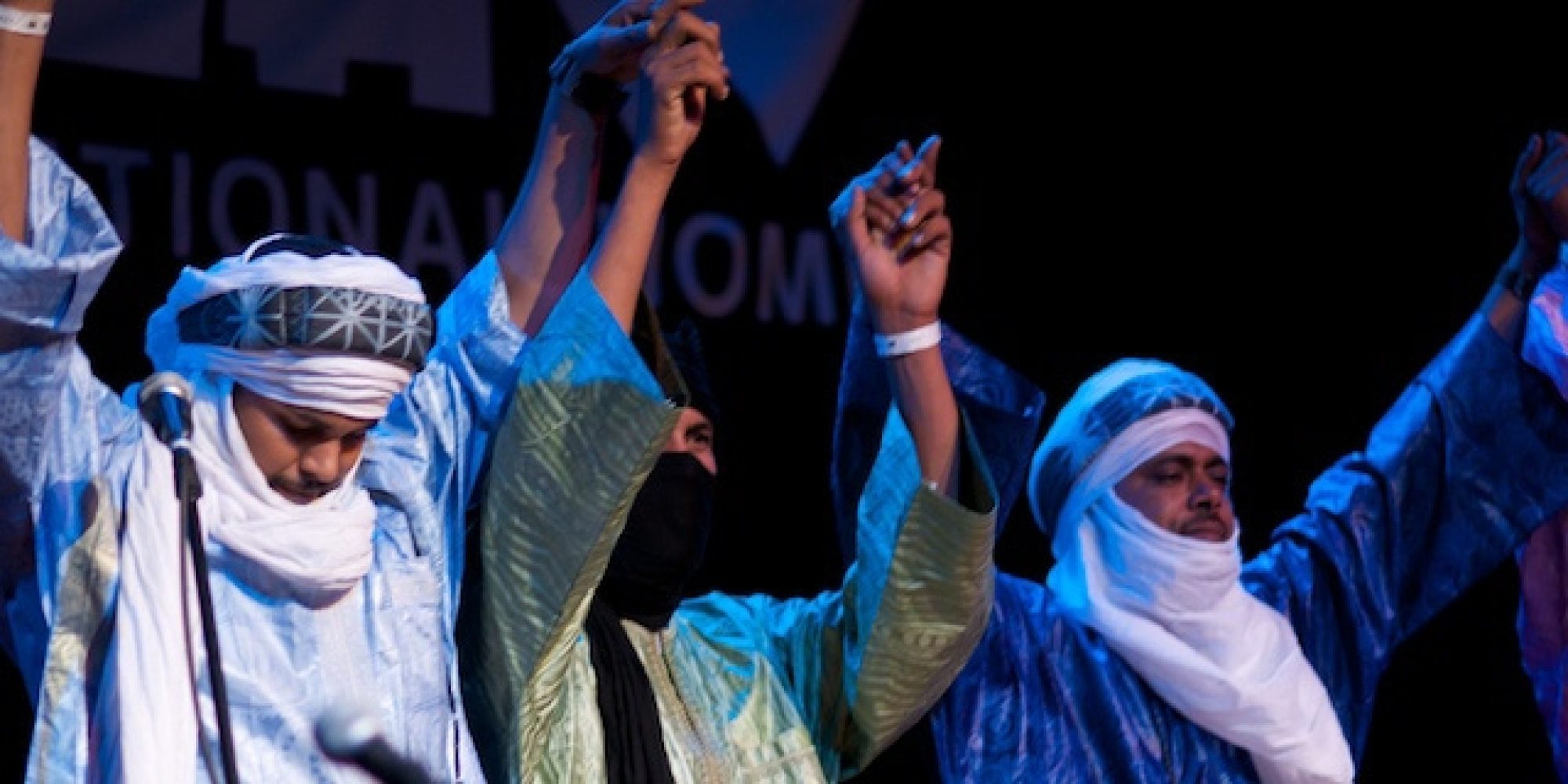Tinariwen played 5 US shows in June, 2012, their first gigs here since forces in the north of Mali—the musicians’ home—declared an independent state of Azawad. Initially, Azawad was presented as a Tuareg homeland, the realization of a vision that has consumed the members of Tinariwen since the band’s beginnings in refugee camps of Algeria and Libya, going back to the 1970s. However, it seems now that the extreme Islamist forces of Ansar Dine are in fact in the driver’s seat—banning music, demanding women to be veiled and mostly homebound, and destroying centuries-old shrines and manuscripts in Timbuktu. Further complicating the picture is a robust drug trafficking industry in which players sometimes disguise themselves as Islamists or Tuareg rebels, when their true interest is protecting turf.
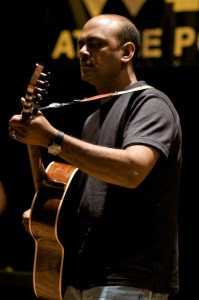
This was heady stuff to get into with my old friend Abdallah Ag Alhousseini of Tinariwen in between the band’s soundcheck and performance at Warsaw in Williamsburg, Brooklyn. We started on the lighter side. I showed him a clip from a video I shot on the streets of Bamako in 1996. Recently, while reviewing this old footage, I realized that I had chatted with and filmed Abdallah years before I met him officially and heard Tinariwen. The young kid in a straw hat in this video seems a far cry from the robed, turbaned gentleman we see today, but the telltale smile is unmistakable.
Banning Eyre: Abdallah, the video clip we just watched together was filmed in 1996. I think you had just recently come to Bamako then. You were not long out of the camps in Libya where you met and joined with the older members of Tinariwen. Tell me what your life, and the life of Tinariwen was like then, in 1996.
Abdallah Ag Alhousseini: In 1996, there weren't enough contacts yet, or even much communication, between Tinariwen and Bamako. But I had been trying since 1995, since the accord, the peace—the integration, in fact. So my intention was to approach a big city like Bamako, or Niamey or Ouagadougou. The goal was to have what we have now, the ability to leave and come back, to tour in America or Europe. It was possible to think about those things now that peace had returned. I wanted to stay in the city like Bamako or Niamey or Ouaga to stay in contact with the rest of the world. We first arrived in Bamako in 1993. We played our first concert there that year. There was a great guitar player of Tinariwen who died in 1995, Inteyedin.
B.E.: He was one of the founders.
A.A.: Yes, he was one of the founders of Tinariwen, along with Hassan and our first bass player, Mohamed Abou Hadid. So we organized a concert for the Northern community in Bamako in 1993. It was good. It went well. Even us, we were surprised frankly that Bamako was interesting for artists like us. In 1993, it was not that developed, but it was a lot more developed than the Northern area for a musician. You could find instruments. You could find artists. So, me, since 1993, I was interested in the Bamako scene. I wanted to live there, look for connections to Europe and other opportunities. And after that, Ibrahim came in 1995. He came to live in Bamako at that point. He was coming and going from Kidal all the time in those years
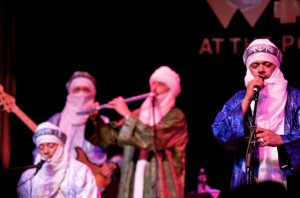
.
B.E.: I remember this time well. I was living in Bamak o with the guitari st Djelimady Tounkara. And we watched them announce the peace in the North, and burn this huge pile of weapons on national television. And this was the moment that made it possible to begin thinking about having a Festival in the Desert, and all the great things that happened in the North after that. Now, of course, it's another story with the dramatic events of this year. What was your experience of this year in the North of Mali?
A.A.: Listen, the events that are happening today in the North, this should not have surprised the world. For me, this was not a surprise. Because you have to know that ever since the arrival of the French occupation, I don't know, in the 1900—1908 or 1910, something like that--when the French arrived in the North of Mali. Ever since then, we have not accepted French command of this territory. So this conflict existed right until the departure of the French. If you look carefully at history, there were terrible massacres during that time that the French were in the North, in Mali and Niger. This was not a struggle against Islam, or for Christianity. No, no, no. It was a fight for territory. The people who are fighting were not saying, "These are Europeans. They are not Muslims." No, no, no. They were fighting for their territory. There was no question of Islam imposed in the struggle. It was simply a question of land. Okay?
Then when Mali came, it was the same thing. It was the same war. There were more massacres in the Kidal region in 1963. People rebelled. They rebelled, and rebelled. Right up to the end, as much as they could, they rebelled. Because the leaders of the fight were all arrested. There was Zeid Ag Attaher, who was arrested by the Algerians and brought to Bamako. There was Mohammed Ali Ag Attaher, who was arrested in Morocco and sent to Bamako. There was also Alladi Ag Alla, who was the main military leader. He was also arrested, because he didn't have enough forces to fight the Army. So he was arrested near the Algerian border.
In fact, he was even arrested within Algerian territory. It wasn't even Malian territory where he was arrested. So there was a lot of fighting seen in 1963, but the leaders were all arrested and brought to Bamako.
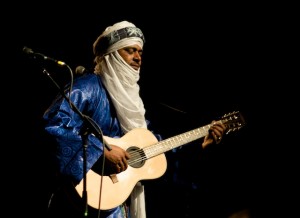
B.E.: In 1963, the early years of Mali.
A.A.: Yes, and that's what you hear in this song, the Tinariwen song, "1963."
B.E.: Oh, yes. That was one of Ibrahim Ag Alhabib's first songs, the one he wrote after his father was executed for aiding the rebellion. [Click here for a New Yorker analysis of Tinariwen songs of the struggle.]
A.A.: That's right. Okay, so the conflict has continued from that day right up until today. Every generation arrives with other means, with other technologies, more sophisticated than the generation before. So, this year, there was a new generation who came many more are materials and means an experience. Much more than we had in 1990.
B.E.: And this has to do with the fall of Qaddafi in Libya. That's right?
A.A.: Yes. That's true. There is Mohamed Ag Najem today who is chief of the Army of Azawad. He came from Libya. He brought all of his equipment from there. Because after the fall of Qaddafi, he left with everything that he had in terms of weapons and men and returned to his own territory.
B.E.: So that changed the balance in the region. And this was happening just as the Festival in the Desert was ending this year, right?
A.A.: Yes, the same day as the festival.
B.E.: And Tinariwen had played. Were you still there?
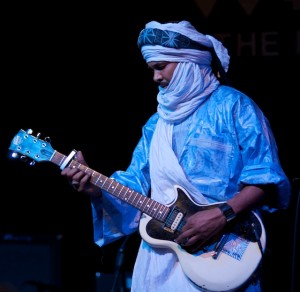
A.A.: We were on the road. We had just left Timbuktu on January 17th. And the first revolt happened on the 17th. We had left Timbuktu that same day. We finished the Festival, and we were on our way to another Festival in Borem.
B.E.: And you say that this was not a surprise for you.
A.A.: No, this was not a surprise for me. For Westerners, it may have been a surprise to see what happened.
B.E.: I think it was a surprise for some citizens of Timbuktu as well.
A.A.: Ooooo. I don't know. The people in Timbuktu, some of them were involved in the rebellions of 1963 and 1990. They were not surprised.
B.E.: But Abdallah, this means that the peace that existed between 1996 and today was not a real peace.
A.A.: There has never been a real peace in the North of Mali from 1963 up until today. Because a real peace would be what? It would be to resolve things definitively. Ever since 1963, accords have calmed things down. These were agreements, but there was never something definitive, from 1963 up to the present. Still there is a problem. We will have to go back and fix things. Because we know very well that the problem is not solved.
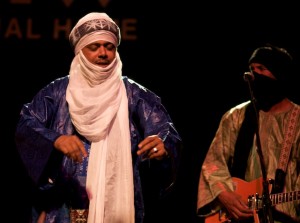
If you want to know the truth, it's very complicated. These problems are very complicated. Why is it so complicated? Because when you talk about us, in the North in Mali, even France who colonized Mali to begin with, found us there in our territory. But after France left, she gave the territory to Mali. But she couldn't give the North to Mali. That was for the people who live there. France had nothing to do with it. Because if it wasn't for France, we would've had nothing to do with the rest of Mali. The people who came from Bamako to command Kidal, they would never have come if it weren't for the French. And we would never have gone to Bamako at that time. Because there was no interest, no need, no obligation to go from Kidal to Bamako. And those who came from Bamako to Kidal, the same thing. They had no interests in Kidal, no knowledge of the territory, no relationships, no business, no friendship. Nothing. It was the French who put Kidal and Bamako into communication, two lands that had nothing to do with each other. Nothing in common, except that the French had taken both territories and felt obliged to put the two together. If you want to rule territory, you need to keep it together.
So it was them who put us together, if you want the truth. It wasn't us. It did not come from us. If they had not put us together, you would find us today in Azawad, and the rest of the Mali would be apart. But this problem exists now. So to solve it, we need real experts, people with real means, people who can really sit at the table talk the way we are talking now, you and me, without a lot of attention, just clearly talking, looking at the history as it is. And from that, we can find the solution.
We are ready for that. Even if you call Azawad a country within the country of Mali, but in a manner well respected. What do I mean by a well-respected manner? To know that the needs of the people in the North are completely different from the needs of the people in the South. So how do you recognize that? You have to make available materials and situations appropriate to the environment. Okay? Me, I'm am an artist living in the desert. I don't have the same needs as someone living in Bamako or Segu or Sikasso. The guitar that I need to use their will be different, the car, the house, the rugs, the plates and forks—all the materials will be different. That's not the fault of anyone. That's nature.
So, to have a solution, we just need to understand that this territory is going to be different from the rest, and manage things accordingly. And right away you will have a solution.
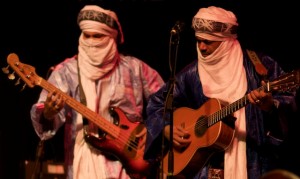
B.E.: Abdallah, if this were simply a question of the needs of the people in the North--not just Tuareg, but Sonrai, Fula, etcetera--and the people of the South, that would be one thing. But added to all that, we have the problem of the Islamist agenda, and also, I've read that a lot of the money that is funding this struggle comes from trafficking of drugs. There's a lot of money and a lot of arms connected with that. And I've even read that some of the people who are talking about religion, are actually just protecting their turf, so they can continue to make money off this drug trafficking. So how does that complicate all of this?
A.A.: Okay, that is a question that is complicated even for me. Those who talk about religion up there, or the problem of drugs up there... Because these are questions I have never verified to understand definitively, as I have the question of Azawad and the Tuareg people. This is an area where I have never really done the work to know profoundly understand it. There are things that I've seen, or that I've heard. It's true that there is a traffic of drugs. That's true. I can't say it's not. Everyone knows this. But these drugs came from where?
B.E.: South America, I think, heading for Europe.
A.A.: Voila. And we are in the road. Me, today, I'm in New York. But I come from Kidal. I pass through because New York is in my route, but I'm not from here. I'm just passing through. It's the same thing with the drugs. They leave South America and they go to Europe. Now, if you want to block all these drug routes, you should start in South America, not in the North of Mali. If you stop them in South America, they will never reach the North. We don't even have access to the sea. No boats arrive in the desert. We don't have any international airports. You have to know what airport these drugs arrived at, or what ports they arrived at. It's the port of Noakchoat. It's the port of Dakar. It's the ports of Côte d'Ivoire. You need to look there if you really want to stop this. If you wait until the drugs are crossing the desert, you will never stop them.
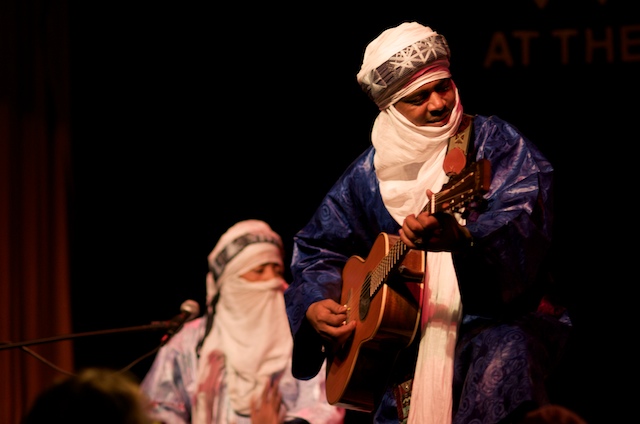
B.E.: Understood. But I know that there are people who live in the desert, local people, who make a lot of money off this trade, and they are interested in defending that business. And I've read that some of those people take up the cause of the Tuareg, or of the Islamists, but their real interest is money, and controlling their turf. So this makes it even harder to understand, because you don't really know if people who talk about religion are concerned about that, or something else. But you say you have the same problem in trying to understand this.
A.A.: I have the same problem to know exactly what is happening. But, it looks to me that these are different things. Even if there are links, because all the world is linked... I mean, I can tell you that there's no link somewhere between people who preach Islamic people who traffic drugs. I can’t tell you that. It's possible. Because the whole world is linked. The drugs that leave Colombia come to my home in the desert, and on to Europe. We are all linked. Even yourself, if you look hard enough, you might find that you are also linked to all of that. So I don't know whether the drug traffickers and the Islamists are working together in some way. I don't know that. As I say, this is something that I have never done the work to really verify to know the true routes, and the true nature of this. That's why I don't want to state an opinion on this theory. What I know that you are is that the question of Islam is very complicated. And the problem of drugs is even more complicated.
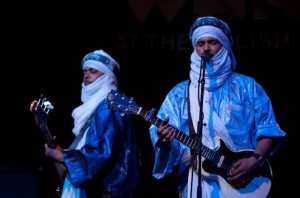
B.E.: Even more?
A.A.: Yes. So these are things I have never studied enough to know where they come from, where they are going, or who is really behind it.
B.E.: Okay, enough about the drugs. But let's talk about the Islamists. Right now you have a situation in Timbuktu where they've banned music off the radio, and they are looting and doing violence. That's very difficult. Talk about that.
A.A.: Okay. There is a group today that's called Ansar Dine. That is true. But you must know that this group existed before these recent troubles in the North of Mali. It's not just this year that this group came along.
B.E.: Yes, Salif Keita talked to me about this group years ago.
A.A.: The Americans know this very, very well. America has financed Mali for over 10 years to control these people. America has financed Algeria for more than 12 years, or 13 years, to survey these people, to know exactly what they're doing. So these people existed before the creation of Azawad. Not the creation of Azawad... Before the events of this year, these people existed. But this year, they found an opportunity to make themselves known, to present themselves.
B.E.: And to seize power.
A.A.: Yes. Because this year, there was a war, a conflict, and with that, they could take advantage of the situation. But they are there today. They are in the territory. But you must know, without forgetting that they are there, that for more than 15 years they have been in the area of Kidal and Timbuktu.
B.E.: But now they are in power.
A.A.: They are not in power.
B.E.: Well, I hope you are right. It's hard to tell, isn't it? But let me ask you a question about music. What can you do to ensure that in an Azawad of the future, there will be a place for artists and musicians?
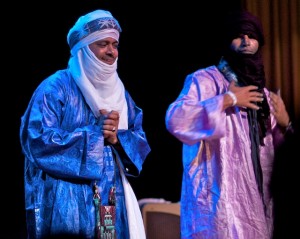
A.A.: Yes. Everything is new for people. The ones we are calling Islamists who are there, they are new. It's new for the people to see them like that. Before they were more hidden. Now they have presented themselves. Okay? So it's a new version for us. Now to deal with that, to find a solution, that is going to take us some time. But what is sure, 80% of the population of the North are going to rebel against that. Now, in this revolt, I cannot say what results will come afterwards. If the population is more strong than these people, they can chase them from their country. That would work. If these people are more strong than the people of the territory, my opinion is that it will be something like Afghanistan. They will stay in the mountains and keep fighting. I don't know. That's my personal opinion. I don't know what's going to happen or what's not going to happen. But that's what I think.
B.E.: The songs of Tinariwen tell the story of this struggle, all the way back to 1963. And by the way, congratulations on the Grammy award this year for the album Tassili.
A.A.: Thank you.
B.E.: Looking ahead, how will you as artists response to this new reality? Are you writing songs about this situation now?
A.A.: Well, now, the question of artists responding to events, that's not something you can talk about exactly. Because Tinariwen is made up of guitarists, singers and composers, and everyone sees things in his own way. The way I view things, or the way Ibrahim sees things, it's not necessarily the same thing, the same vision.
B.E.: So you have a diversity of views in the group.
A.A.: Voila. And, as I told you, this is a new version for us, everything that's happened this year. Now as artists, how we will view this, maybe it takes some time. Maybe it will be after a year, maybe more. Because a true artist is never tied to events. Sometimes he sees things 10 years, three years, four years in advance. He sings about an event before the event even happen. Sometimes the events come, but you hear nothing. Because the artist spoke about these events years ago. So we don't just look at what's happening today, and sing about that.
B.E.: So there are no new Tinariwen songs about the situation.
A.A.: No. Not yet.
B.E.: And let me ask about some of the others who are not here. First, Ibrahim. Is he okay?
A.A.: Ibrahim is doing very well. He's at home in Afara. Afara is a place near Tessalit.
B.E.: I read that at one point he was stuck in a refugee camp. Is that true?
A.A.: Well, listen, around him, that's where the refugee camps are. Everything is right around him. That's where the refugees are.
B.E.: And Hassan?
A.A.: Hassan is in Paris. We will be with him in a few days.
B.E.: When was the last time you were in the North?
A.A.: I have not been in Kidal since February.
B.E.: Do you plan to go?
A.A.: I hope so. I hope to return soon. If God wills it. The month of Ramadan is coming. Normally I would go to Kidal. It depends. It's God who knows that.
B.E.: Well, I wish you good luck. You're in a situation with a lot of promise and a lot of danger.
A.A.: [LAUGHS] That's how life is. When you are in a situation that pleases you, that's when you find out that there is a lot of danger afterwards. The day you feel really at ease in life, you have to know that this is also the most dangerous day for you. Because there are when you are at ease, that's when you really fall into problems.
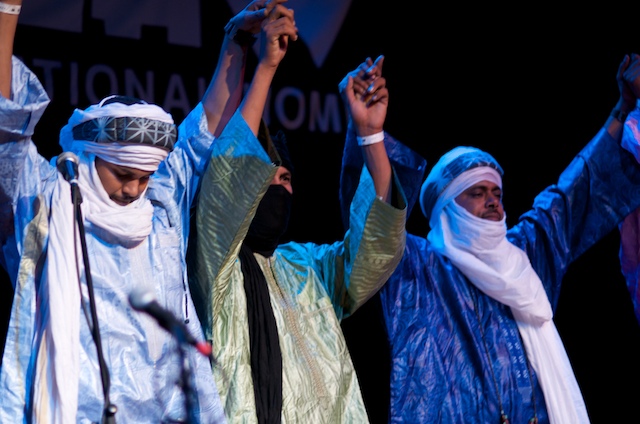
B.E.: Finally, the Festival in the Desert. When do you think it might happen again? In five years? In 10 years? What do you think?
A.A.: Me, I think that it's Many Ansar who organizes the Festival in the Desert. It's complicated. He could do something this year in the refugee camps, he could create something small, something simple, an homage to the Festival. Because we can't do it this year. We would have to do it in a refugee camp.
B.E.: Tessalit.
A.A.: Tessalit or somewhere else. I don't know. That depends on the Festival organizers. But they would bring trucks of medicine and vitamins, and things like that. Artists would come and perform, make the Festival for the refugees. It wouldn't be the same. Not the same as before.
B.E.: An homage. I see. Thank you very much for this time.
After Tinariwen's concert at Warsaw, I spoke with Abdallah informally. I told him that I had interviewed a number of Malian musicians in the past few months about events in the country. Since so many of them, like Abdallah, said they favored a peaceful solution--talking--it seemed there was some hope of resolution. I said I hoped that the community of Malian musicians would remain close. His answer, not entirely reassuring, was that the musicians of the North would stay close.








